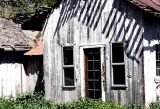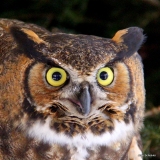- Forum
- General Discussion | Introductions | Off Topic Forum
- The Lounge
- Why is it colder when it's wet?
Why is it colder when it's wet?
-
 Topic Author
Topic Author
- jennyjohn52
- Has the Hang of it
-
- CANON A620
- Followers: 147
- Posts: 55
-
Points:
10
Post #38358
Why is it colder - or at least why does it SEEM colder - at say 45 degrees and raining than at 10 below but dry. I spent years in Colorado at almost 9000' elevation and the temperatures were often way below zero for weeks at a time in the winter.
Now I'm in Southern California at 3500' with temperatures in the 40s and 50s but a lot of rain this winter and I feel like I can't get warm, no matter what I do.
-

- Scotty
- Agent 007
- James Bond, PT mod.
- Followers: 1088
- Posts: 9863
-
Points:
14659
-

- Baydream
- Moderator
-
- Canoni/60D/70D/5DmkIII
- Followers: 388
- Posts: 11185
-
Points:
7278
Post #38368
Therefore the rain (which may start as snow in the clouds) will be colder than the surrounding air and therefore absorbs heat from this surrounding air.
In the higher elevations of Colorado, their is very little moisture to absorb heat from the air, therefor you feel warmer even at colder temps.
In SoCal, the rain is absorbing the heat from the air. In the summer, the rain will prevent the body from releasing heat so the humidity will make you feel warmer.
Whew. I think I have that correct.
Shoot, learn and share. It will make you a better photographer.
fineartamerica.com/profiles/john-g-schickler.html?tab=artwork
-

- Scotty
- Agent 007
- James Bond, PT mod.
- Followers: 1088
- Posts: 9863
-
Points:
14659
Post #38369
Baydream wrote: When moisture is falling it is pulling the cold air from the upper atmosphere down with the pressure that the drops are falling down at so the heavier the rain the more cold air that will be brought down with it
Therefore the rain (which may start as snow in the clouds) will be colder than the surrounding air and therefore absorbs heat from this surrounding air.
In the higher elevations of Colorado, their is very little moisture to absorb heat from the air, therefor you feel warmer even at colder temps.
In SoCal, the rain is absorbing the heat from the air. In the summer, the rain will prevent the body from releasing heat so the humidity will make you feel warmer.
Whew. I think I have that correct.
Here's tom with the weather!
When the last candle has been blown out
and the last glass of champagne has been drunk
All that you are left with are the memories and the images-David Cooke.
-

- Baydream
- Moderator
-
- Canoni/60D/70D/5DmkIII
- Followers: 388
- Posts: 11185
-
Points:
7278
Post #38371
Actually, I studied meteorology way back in 8th grade, before they had real weather. I now volunteer at the local NBC affiliate and get to know the weather team pretty well.Scotty wrote:
Baydream wrote: When moisture is falling it is pulling the cold air from the upper atmosphere down with the pressure that the drops are falling down at so the heavier the rain the more cold air that will be brought down with it
Therefore the rain (which may start as snow in the clouds) will be colder than the surrounding air and therefore absorbs heat from this surrounding air.
In the higher elevations of Colorado, their is very little moisture to absorb heat from the air, therefor you feel warmer even at colder temps.
In SoCal, the rain is absorbing the heat from the air. In the summer, the rain will prevent the body from releasing heat so the humidity will make you feel warmer.
Whew. I think I have that correct.
Here's tom with the weather!
And I remember how cold it is at 14,000 feet atop Pikes Peak where there's little oxygen and constant wind.
Shoot, learn and share. It will make you a better photographer.
fineartamerica.com/profiles/john-g-schickler.html?tab=artwork
-

- Scotty
- Agent 007
- James Bond, PT mod.
- Followers: 1088
- Posts: 9863
-
Points:
14659
Post #38373
Baydream wrote:
Actually, I studied meteorology way back in 8th grade, before they had real weather. I now volunteer at the local NBC affiliate and get to know the weather team pretty well.Scotty wrote:
Baydream wrote: When moisture is falling it is pulling the cold air from the upper atmosphere down with the pressure that the drops are falling down at so the heavier the rain the more cold air that will be brought down with it
Therefore the rain (which may start as snow in the clouds) will be colder than the surrounding air and therefore absorbs heat from this surrounding air.
In the higher elevations of Colorado, their is very little moisture to absorb heat from the air, therefor you feel warmer even at colder temps.
In SoCal, the rain is absorbing the heat from the air. In the summer, the rain will prevent the body from releasing heat so the humidity will make you feel warmer.
Whew. I think I have that correct.
Here's tom with the weather!
And I remember how cold it is at 14,000 feet atop Pikes Peak where there's little oxygen and constant wind.
Do any storm chasing?
When the last candle has been blown out
and the last glass of champagne has been drunk
All that you are left with are the memories and the images-David Cooke.
-

- Baydream
- Moderator
-
- Canoni/60D/70D/5DmkIII
- Followers: 388
- Posts: 11185
-
Points:
7278
Post #38374
Not since we were caught in a waterspout in the Chesapeake Bay, had a hurricane hit, and then a tornado touched down in our yard, all in the same year summer. Last fall, we weathered a hurricane in out little cottage on the bay in Canada. On the Bay of Fundy, the storms come to us, no chasing necessary.Scotty wrote:
Baydream wrote:
Actually, I studied meteorology way back in 8th grade, before they had real weather. I now volunteer at the local NBC affiliate and get to know the weather team pretty well.Scotty wrote:
Baydream wrote: When moisture is falling it is pulling the cold air from the upper atmosphere down with the pressure that the drops are falling down at so the heavier the rain the more cold air that will be brought down with it
Therefore the rain (which may start as snow in the clouds) will be colder than the surrounding air and therefore absorbs heat from this surrounding air.
In the higher elevations of Colorado, their is very little moisture to absorb heat from the air, therefor you feel warmer even at colder temps.
In SoCal, the rain is absorbing the heat from the air. In the summer, the rain will prevent the body from releasing heat so the humidity will make you feel warmer.
Whew. I think I have that correct.
Here's tom with the weather!
And I remember how cold it is at 14,000 feet atop Pikes Peak where there's little oxygen and constant wind.
Do any storm chasing?
Extreme High tide with a storm. That's out cottage .
Shoot, learn and share. It will make you a better photographer.
fineartamerica.com/profiles/john-g-schickler.html?tab=artwork
-

- Scotty
- Agent 007
- James Bond, PT mod.
- Followers: 1088
- Posts: 9863
-
Points:
14659
Post #38375
Baydream wrote:
Not since we were caught in a waterspout in the Chesapeake Bay, had a hurricane hit, and then a tornado touched down in our yard, all in the same year summer. Last fall, we weathered a hurricane in out little cottage on the bay in Canada. On the Bay of Fundy, the storms come to us, no chasing necessary.Scotty wrote:
Baydream wrote:
Actually, I studied meteorology way back in 8th grade, before they had real weather. I now volunteer at the local NBC affiliate and get to know the weather team pretty well.Scotty wrote:
Baydream wrote: When moisture is falling it is pulling the cold air from the upper atmosphere down with the pressure that the drops are falling down at so the heavier the rain the more cold air that will be brought down with it
Therefore the rain (which may start as snow in the clouds) will be colder than the surrounding air and therefore absorbs heat from this surrounding air.
In the higher elevations of Colorado, their is very little moisture to absorb heat from the air, therefor you feel warmer even at colder temps.
In SoCal, the rain is absorbing the heat from the air. In the summer, the rain will prevent the body from releasing heat so the humidity will make you feel warmer.
Whew. I think I have that correct.
Here's tom with the weather!
And I remember how cold it is at 14,000 feet atop Pikes Peak where there's little oxygen and constant wind.
Do any storm chasing?
Extreme High tide with a storm. That's out cottage .
I love extreme weather. I don't like the injuries, loss of life, damage. I just like the power of the storm.
When the last candle has been blown out
and the last glass of champagne has been drunk
All that you are left with are the memories and the images-David Cooke.
-

- Baydream
- Moderator
-
- Canoni/60D/70D/5DmkIII
- Followers: 388
- Posts: 11185
-
Points:
7278
Post #38377
My wife used to love it until the tornado hit. Hurricanes she can stand, a tornado is a different beast. Greenish, sideways winds, and a terrifying roar. Seen it twice (the waterspout and the tornado) and that's enough.Scotty wrote: I love extreme weather. I don't like the injuries, loss of life, damage. I just like the power of the storm.
Shoot, learn and share. It will make you a better photographer.
fineartamerica.com/profiles/john-g-schickler.html?tab=artwork
Post #38442
It has a lot to do with physics. A person will suffer hypothermia in cold water much faster than a person in cold air of the same temperature. The conductivity of the heat away from the body is much faster. This holds true for wind chill and also explains why blocking this thermal transfer with insulated clothing and blankets works so well. Damp, dense, high humidity air conducts heat better than dry air. It's why we sweat so much in Florida during the summer and why you are colder in your moist cold air environment.
I forgot... the higher altitude is a factor as well. Vacuums do not conduct heat well at all.
“Amateurs worry about equipment, professionals worry about money, masters worry about light, I just make pictures… ” ~ Vernon Trent
-

- Baydream
- Moderator
-
- Canoni/60D/70D/5DmkIII
- Followers: 388
- Posts: 11185
-
Points:
7278
Post #38467
We have a Oreck vacuum, does that matter?chasrich wrote: Vacuums do not conduct heat well at all.
Shoot, learn and share. It will make you a better photographer.
fineartamerica.com/profiles/john-g-schickler.html?tab=artwork
- Forum
- General Discussion | Introductions | Off Topic Forum
- The Lounge
- Why is it colder when it's wet?
Latest Reviews
Nikon’s retro-looking Nikon Zfc is anything but retro. Under its classic body is a host of features and amenities that make it a worthwhile compact mirrorless camera for 2024.
The Canon EOS R50 is one of the newest R-system cameras from Canon. Is it worth your money? Find out all the details you need to know in this comprehensive review.
The Sony FE 70-200mm f/2.8 GM OSS II is Sony’s flagship mirrorless zoom lens. As such, it’s loaded with features and has a top-shelf build quality that makes it a top pick!
The Leica SL2-S is an attractive, premium mirrorless camera with photo and video specs that are sure to impress. And with the legendary Leica name, you know this camera exudes quality!
Forum Top Posters
-
1Hassner 18 posts
-
2JaneK 13 posts
-
3James Sencil 4 posts
-
4Stella Marize 4 posts
-
5David John Wark 4 posts
-
6Stacy Miller 3 posts
-
7April Saunders 3 posts
-
8Pettigrew 3 posts
-
9Oscar Robinsons 3 posts
-
10Tamara Dowell 3 posts
Latest Articles
The Olympus OM-D E-M10 Mark IV is a micro four thirds camera released in 2020. It’s an entry-level system along with the OM-D E-M5 Mark III. Use this guide to determine which one is best for you!
Blue hour photography might not be as well known as golden hour photography, but it is every bit as good a time to create epic images of landscapes. Learn how in this quick tutorial!
Nikon’s retro-looking Nikon Zfc is anything but retro. Under its classic body is a host of features and amenities that make it a worthwhile compact mirrorless camera for 2024.
Moving from taking snapshots of your dog to creating beautiful images doesn’t have to be that difficult! Use the tips outlined in this dog photography guide, and you’ll get better results in no time.
Acrylic print photos are a beautiful way to display your favorite images. But they don’t come without some questions. Get all the answers you need about this medium in this guide!
Where do you get your landscape photography inspiration? Is it from masters like Ansel Adams? Or perhaps viewing art from other genres? We’ve got these and a few other sources for you to check out!
The Canon EOS R50 is one of the newest R-system cameras from Canon. Is it worth your money? Find out all the details you need to know in this comprehensive review.
Too often, affordable online printing companies don’t meet your expectations of what a print should look like. But there are some choices that combine affordability with superb quality!















